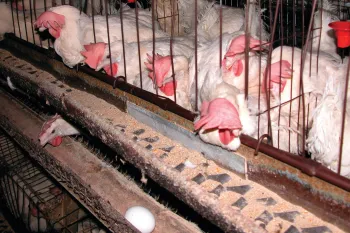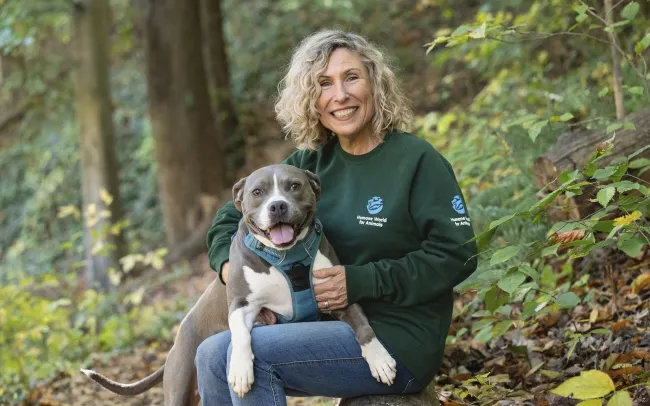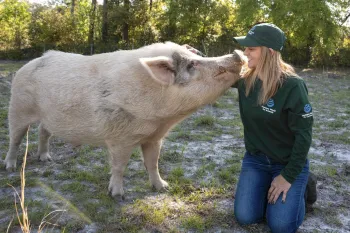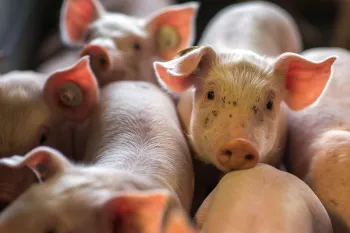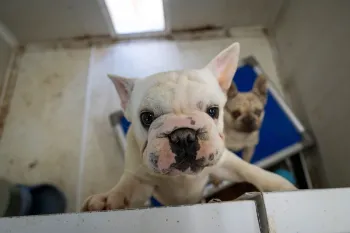More than 94.9 billion land animals are kept and killed for food worldwide. This is staggering. And it’s a number that has continued to rise in recent years.
Fighting to change the lives of all these billions of animals—who are essentially born or hatched into the world just to suffer before they are killed—is an issue many people find overwhelming. And fighting to prevent more animals being born just to suffer and feed this cruel system seems like a goal too out of reach.
Mother pigs are trapped in metal cages so horribly restrictive they can’t turn around or even move more than a step in any direction. Chickens, who have experienced nothing but suffering in cramped and unsanitary facilities, are crudely slaughtered at breakneck speed on increasingly accelerated processing lines.
None of this suffering is necessary. We fundamentally believe that we can do something to change it—and we must. Taking on fights for animals considered too impossible to succeed is exactly what we do—it is exactly who we are.
Our approach
Our approach to ending cruelty for farmed animals comes from two distinct angles. We advocate for a more plant-forward food system, working with institutions like food companies and the food service industry to meet their commitments to replace meat, eggs and dairy with expanded plant-based alternatives. In this way, we reduce demand and bring down that staggering number of animals raised to be killed. At the same time, we focus on reducing the suffering of animals who are kept and killed for food right now, by advocating for the passage and enforcement of laws that protect the welfare of farmed animals.
In this way, our approach is focused on a more compassionate future without giving up on the animals entrenched in the system at this very moment.
Ending the cage age for farm animals
In 2023, our fight for farmed animals reached the Supreme Court of the United States where we met the pork industry trade association head on. The case involved California’s Proposition 12, a ballot initiative that we crafted and that the state’s voters passed in 2018 with 63% in favor. Proposition 12 requires that mother pigs, hens used for egg production and calves kept for veal be given at least enough space to stand up, turn around and extend their limbs. The law also requires that pork, eggs and veal sold in the state be produced without the use of inhumane, extreme confinement systems.
Giving animals a little bit of space is a reasonable thing to do. We’ve seen pigs in gestation crates chewing the bars of their cages until their mouths bleed. And zoonotic diseases spread like wildfire through extreme confinement systems. Many farmers and producers endorsed and adopted Proposition 12’s standards. And yet, some backward segments of the pork industry have spent millions of dollars trying to overturn Proposition 12 and other state measures like it.
We defended this historic progress at the highest court in the U.S.—and we prevailed. The Supreme Court rejected the National Pork Producers Council’s primary constitutional claim: “While the Constitution addresses many weighty issues, the type of pork chops California merchants may sell is not on that list.”
And just last week, in another win, the Supreme Court declined to review a similar bid by the pork industry to overturn Proposition 12 in Iowa Pork Producers Association v. Bonta.
Proposition 12 is just one of many examples of using the law to move away from animal cruelty and toward a more humane future.
Using the law to protect farmed animals from cruelty is in our bones
When our organization first formed in the mid-1950s, our first campaign focused on the passage of a federal humane slaughter law in the U.S.—the Humane Methods of Slaughter Act—a landmark law that sought to minimize the suffering of farmed animals during slaughter.
We’ve never stopped fighting for their protection and defending the progress we’ve helped to secure over the long term. In 2009, we used our footage from a grim undercover investigation along with evidence of associated risks of “mad cow disease” to press for a U.S. Department of Agriculture rule banning the slaughter of downed cattle (those too sick, weak or injured to stand on their own). In 2016, we secured the Downer Calves Rule, which closed a loophole in the federal regulation that banned killing downed cattle for human consumption but did not include downer calves, leaving them vulnerable to abuse and suffering.
In 2023, we helped secure passage of a landmark federal regulation that brought animal welfare standards into alignment with the kinds of animal treatment that people expect from organic products. The Organic Livestock and Poultry Standards rule incorporated the same basic humane housing standards for hens, pigs and calves involved in organic production that we codified back in 2008 with California’s Proposition 2, another ballot measure passed on farmed animal welfare. This was a win that took years, spanning three presidencies, to achieve.
A worldwide movement for change
Changing the food system today requires an understanding of the global nature of industrial animal agriculture. Currently, multinational corporations like JBS and Smithfield dominate meat processing worldwide, controlling virtually all stages of the supply chain.
From Australia to Mexico, from Brazil to Thailand, from Canada to Viet Nam, and in the dozens of other countries in which we are active, we’re mounting campaigns to reform this system while appealing directly to the public to make kinder choices.
Ending the cage age for farmed animals means pushing global institutions to transform their approach. For instance, finance institutions are starting to transform their investment strategies: The International Finance Corporation no longer finances animal production practices such as confining hens in the egg industry to battery cages and confining pregnant pigs in gestation crates for their entire pregnancy.
Holding food companies accountable
Our undercover investigation of Hallmark/Westland Meat company (which was at the time the second largest supplier of beef to the National School Lunch Program) led to the biggest beef recall in history, and a federal court judgment nearly $500 million, the largest ever levied for cruelty to animals, and the result of the lawsuit that we filed against the owners. Our investigator’s video revealed employees kicking, gouging eyes, shooting water into animals’ noses, and using electric shock and forklifts to try to force downed cows to stand briefly so that they could pass pre-slaughter inspection.
Going undercover is just one way of holding food systems accountable. In more recent years, we have worked closely with food companies to help them meet commitments to animal welfare that so many people want to see. We’ve persuaded some of the world’s largest food companies to announce plans to eliminate extreme confinement systems for pigs and hens from their supply chains—and we have worked to hold them to their promises.
We’re not afraid to exert pressure when we need to: In our latest corporate campaign in the U.S., we’re calling out Target for breaking its promise to end the use of crates and cages in its supply chain, a commitment the company made a dozen years ago. And we recently settled a long-running lawsuit against Smithfield Foods over their advertising claims concerning the use of gestation crates for pigs.
Some recent wins include Arcos Dorados (McDonald’s in Latin America) fully implementing its commitment in Brazil for cage-free shell egg procurement, and McDonald’s announcing that it now uses 100% cage-free eggs at all U.S. locations. Just last year, we helped more than 40 companies work toward implementing higher welfare procurement policies for hens in egg production and mother pigs.
No animals were harmed in the making of this meal
A unique component of our approach to helping farmed animals involves actual chefs on our team who work with major food service companies to train culinary professionals around the world on how to create delicious plant-based food. Everyone wins with this kind of partnership. For example, colleges that have made a commitment to sustainability or healthier menu options can use plant-based dining options to achieve those goals.
There’s one thing about reform in this space that will always be true: The individual can make a difference for farmed animals every single day, at breakfast, lunch and dinner. Many people have become more receptive to reducing meat and dairy in their diets, and more and more people worldwide are embracing plant-based eating completely.
All animals deserve protection, including those raised for food. We believe fundamentally that a more humane world is possible. But we cannot do it without you. Join us in making a difference for animals.
Sara Amundson is president of Humane World Action Fund.
Meredith Lee/Humane World for Animals
Free Guide: Compassionate Eating
Learn what food labels really mean and how to choose animal-friendly, plant-based options with our free guide. Get expert tips and recipes your whole family will love.
